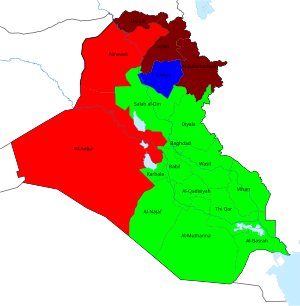Ninawa governorate election, 2013
|
|
|||||||||||||||||||||||||||||||
|---|---|---|---|---|---|---|---|---|---|---|---|---|---|---|---|---|---|---|---|---|---|---|---|---|---|---|---|---|---|---|---|
|
|||||||||||||||||||||||||||||||
|
All 39 seats for the Ninawa Governorate council |
|||||||||||||||||||||||||||||||
| Turnout | 37.5% ( |
||||||||||||||||||||||||||||||
|
|||||||||||||||||||||||||||||||

Elections in Ninawa & Anbar, marked in bright red, were delayed due to the deteriorating security situation.
|
|||||||||||||||||||||||||||||||
|
|||||||||||||||||||||||||||||||
The 2013 Nineveh Governorate election in Iraq was held on 20 June with elections for the Al Anbar Governorate. Due to security problems, turnout was less than half that of the 2009 election. This election saw Sunni Arab parties lose a number of seats to minority parties.
Nineveh is one of Iraq's most demographically-diverse governorates. Out of a population of about 2.8 million, 2013 estimates cited by Niqash claim about 300,000 Turkmen, (primarily in Tal Afar and Rashidiya. A similarly-sized population of Yazidis live in the districts of Shekhan and Sinjar and near the town of Bashiqa. Some 250,000 Shabaks live in villages north and east of Mosul, and 200,000 Christians live in Bashiqa, Bartella and Bakhdida. There is a sizable Kurdish population, with many Yazidis also identifying as Kurds. Although elections for 13 of Iraq's 18 governorates were held on 20 April, elections in al-Anbar and Ninawa were delayed due to security concerns in the ongoing insurgency and Sunni-led protests.
As of 14 June there were eight attacks on provincial-council candidates in Ninawa, resulting in six deaths (including Muhanad Ghazi, a Sunni Arab candidate for the Iraqi Republican Gathering—a party supporting Prime Minister Nouri al-Maliki). Ghazi was shot dead by unknown gunmen whilst walking home from the East Mosul mosque.
...
Wikipedia


